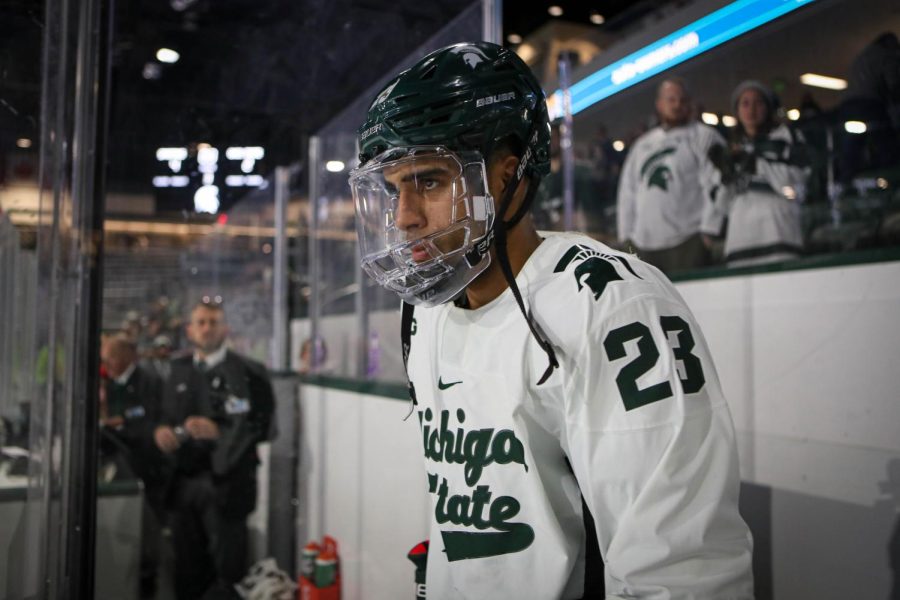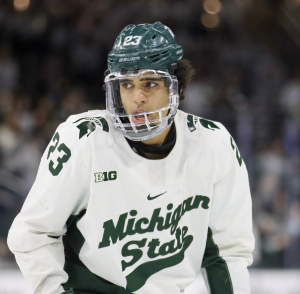Stinson: The response to Jagger Joshua is an embarrassment to the Big Ten, Ohio State and hockey as a whole
Jagger Joshua walks onto the ice after being named one of three players of the game after Michigan State’s 4-2 victory over Ohio State on November 10, 2022. Photo Credit: Sarah Smith/WDBM
November 22, 2022
Before Jagger Joshua said anything, the damage had already been done.
On Monday, Joshua tweeted a statement alleging that an Ohio State player had used a racial slur multiple times in a game against him before receiving a game misconduct penalty and thus being ejected.
Acts of racism do not belong in hockey.. pic.twitter.com/nm9AnIjSgV
— Jagger Joshua (@jaggerjoshua8) November 21, 2022
When looking back at the box score from the MSU and OSU game on Nov. 11 that Joshua referenced, the penalty log tells a starting story. OSU forward Kamil Sadlocha received a game misconduct 10:39 into the second period. Sadlocha was the only player between the two teams to receive a game misconduct penalty in the game.
Jagger Joshua’s statement said an Ohio State player received a game misconduct penalty for using a racial slur repeatedly during the game on Nov. 11. Here’s the penalty breakdown of that game pic.twitter.com/Ssij47DZoc
— Jacob Phillips (@JDPhillips125) November 21, 2022
Hockey has ongoing issues with diversity and inclusion, more so than other sports. The National Hockey League is more than 97% white, according to USA Today. There are currently less than two dozen Black players.
Despite having so few minority players, the NHL still finds itself struggling with how fans treat its athletes of color. Nazem Kadri received racist death threats from St. Louis fans during last year’s playoffs. Some in Chicago told Devante Smith-Pelly to stick to basketball, implying that he should leave to play a more stereotypically Black sport and keep hockey a white man’s game.
Perhaps the most relevant parallel to all this is the situation of Mitchell Miller. In the 2020 NHL Entry Draft, the Arizona Coyotes used a fourth-round draft pick to select Miller, a defensive prospect who in 2016 had been found guilty in a juvenile court of racially abusing a Black classmate with developmental disabilities. After the Arizona Republic issued a report on it following the draft, the Coyotes renounced Miller’s draft rights, and he was removed from the University of North Dakota hockey team.
Exactly one week before the MSU-OSU game, the Boston Bruins signed Miller to a three-year, entry-level contract, despite him showing no real signs of remorse. The only apology from Miller to the classmate was court-ordered.
Similar to Miller, the player who received the game misconduct on Nov. 11 has not taken significant public steps to demonstrate growth. Since Joshua’s announcement, it’s been radio silence from him, and his personal Twitter account is private. No acknowledgment of what happened. No apology. No sign of remorse.
People like Miller or Sadlocha should not have a place in hockey. It falls on the people in power to make the changes necessary to prevent things like this from happening again. However, these things persist, and they do so because those at the top enable it.
There wasn’t much that either the Big Ten or OSU could say that wasn’t too little, too late. The fact that the Big Ten hadn’t publicly acknowledged the incident before Joshua said something was proof the conference wanted to sweep it all under the rug, and was not going to say something if he kept quiet. The expectations for any response from OSU or the Big Ten were modest at best.
Somehow, both groups still failed to meet the already low bar.
Following Joshua’s tweet, the Ohio State athletics department released a statement in which it said the team “worked collaboratively with the Big Ten Conference to come to a resolution” following the incident.
What was this resolution? Was it a suspension of Sadlocha? Nope. He still played in both games the following weekend.
Was it any public apology or show of support for Joshua? Wrong again.
Was it any sort of action plan to educate Sadlocha or correct his mistakes? Strike three.
The statement didn’t give an answer as to what the “resolution” was. Rather, the athletics department used the rest of the space to tout its “remarkable diversity” and the “outstanding job” of its Buckeye Inclusion committee — language that, given the context, comes off as nothing but hollow, self-aggrandizing and tone-deaf.
While Ohio State’s statement was frustratingly vague, the Big Ten released a statement soon after that provided more clarity why the conference did nothing.
The Big Ten now has a statement out on why there was no further punishment for Ohio State’s Kamil Sadlocha beyond a game misconduct for alleged racial targeting of Michigan State’s Jagger Joshua. pic.twitter.com/zIlKNHHO6I
— Todd Milewski (@ToddMilewski) November 22, 2022
While the whole statement is three paragraphs long, there are only two sentences worth reading, and both come at the end of the second paragraph.
First, the Big Ten, based on its investigation, “supports the decision by the official to levy a game misconduct penalty on OSU.” Second, the conference did not discipline the player due to an “absence of indisputable evidence.”
These two statements are contradictory. Either the Big Ten believes the referees or they don’t. The only other evidence the conference could ask for would be a recording of exactly what was said. However, if the conference’s own official — arguably the most neutral third party possible — heard enough and saw it fit to give the game misconduct at that moment, then something clearly had to have happened. Game misconducts are not given out on a whim.
It is my own belief that people like Sadlocha do not deserve the privilege of playing Division I hockey. Although, without concrete, indisputable evidence, a total removal from the team could open up the conference to lawsuits, so I would understand a lesser sentence, such as a suspension.
However, a complete lack of action tells more than enough about the conference and the people in charge.
The issues with the situation go far beyond Sadlocha and this one instance. This is an indictment on everyone involved — head coach Steve Rohlik for letting Sadlocha play the week after, the OSU athletics department for not acknowledging any wrongdoing, and the Big Ten for not disciplining Sadlocha. Each person or group had opportunities both before and after Joshua said something to do what was right. Each one of them failed.
“Inaction in the face of racist comments and actions allow these behaviors to continue,” Joshua said.
I would argue that what the Big Ten and Ohio State have done here is worse than that. There’s a difference between simply not doing anything and saying that you won’t do anything. Publicly announcing that neither the conference nor Ohio State is taking disciplinary action not only allows this behavior but condones it. Saying that things are fine the way they are only sets them up for more of the same down the road.
The question isn’t whether not the Big Ten or Ohio State believes Joshua. They do. If they didn’t, the conference, which worked with OSU on this “resolution,” wouldn’t come out in support of the referee’s decision.
They believe Jagger Joshua. They just don’t care.




































